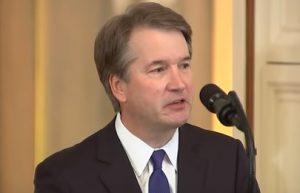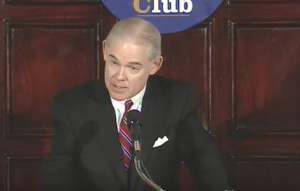Dale Degenshein
-
 Non-Sequiturs
Non-SequitursNon Sequiturs: 02.24.19
* You wouldn’t want to be in the shoes of Jussie Smollett right now — nor the shoes of his lawyers, according to Joel Cohen and Dale Degenshein. [Law and Crime]
* And in other celebrity legal news, the new documentary about Drake has triggered a slew of copyright claims and takedown notices. [All Rights Reserved]
* If you’ve been listening to the compelling new podcast from Wondery about the Dan Markel case, check out this interesting interview with host Matt Shaer. [Uproxx]
* Speaking of podcasts, I recently appeared on Miranda Warnings, the popular podcast by former New York State Bar Association president David Miranda, to talk about Biglaw, legal education, and more. [Miranda Warnings]
* And if you’ll be in Nashville tomorrow or Tuesday, please feel free to stop by either or both of the talks I’ll be giving at Vanderbilt — one on judicial celebrity, and one on the state of legal education. [Vanderbilt Federalist Society / Vanderbilt Law School Library]
* If you’re a libertarian or otherwise concerned about excessive exercises of government power, you should be concerned about President Donald Trump’s invocation of emergency powers, as Ilya Somin explains. [Volokh Conspiracy / Reason]
* Will the Supreme Court ride to Trump’s rescue if and when his national emergency declaration winds up before SCOTUS? Brianne Gorod has her doubts. [Take Care]
* More excellent advice from expert courtroom lawyer David Berg — think of this as “The Trial Lawyer: What It Takes To Lose.” [YouTube]
-
 Non-Sequiturs
Non-SequitursNon-Sequiturs: 07.29.18
* Amy Howe has highlights from Judge Brett Kavanaugh’s completed questionnaire for the Senate Judiciary Committee — including the five different law firms where he worked as a summer associate. [SCOTUSblog]
* Despite Judge Kavanaugh’s impeccable qualifications, the battle to confirm him to the Supreme Court will be hard-fought — and Adam Feldman explains why. [Empirical SCOTUS]
* In other nominations news, Veronica “Ronnye” Stidvent, a prominent Latina lawyer, comes to the defense of Ryan Bounds, whose Ninth Circuit nomination was defeated last week. [Oregonian]
* Does the failure of the Bounds nomination spell trouble for the Kavanaugh nomination? Here are some thoughts from Elizabeth Slattery and me. [SCOTUS 101 / Heritage Foundation]
* Had he been confirmed, Ryan Bounds would have replaced his (and my) former boss, Judge Diarmuid F. O’Scannlain — who just penned a landmark Second Amendment opinion, Young v. Hawaii, that could very well wind up before SCOTUS (and allow the Court to settle a circuit spit). [Volokh Conspiracy / Reason]
* Speaking of the Ninth Circuit, Chris Walker has some concerns about the late Judge Stephen Reinhardt casting the deciding vote in an important tax law case, some four months after his passing. [Notice & Comment / Yale Journal on Regulation]
* Why is the internet such a cesspool today? Media lawyer Charles Glasser identifies five factors behind the decline (and gives a shoutout to Above the Law’s dearly departed comments section). [Daily Caller]
* Elsewhere in the First Amendment world, Joel Cohen and Dale Degenshein argue that it should be easier for parties to have documents sealed in litigation. [The Hill]
* If you appreciate the dying art that is the book review, check out Alice Lloyd’s beautifully written review of Robert Anthony Siegel’s Criminals: My Family’s Life on Both Sides of the Law (affiliate link), which paints a portrait of his father, Stanley Siegel — “a big-hearted and brilliant,” but deeply troubled criminal defense lawyer. [Weekly Standard]
 Sponsored
SponsoredCurbing Client And Talent Loss With Productivity Tech
Law firms must leverage technology to curb client attrition and talent loss, enhancing efficiency and aligning with evolving expectations for lasting success.-
 Non-Sequiturs
Non-SequitursNon-Sequiturs: 07.15.18
* What’s it like to take the California bar exam as a 46-year-old law professor? Orin Kerr enlightens us. [Reason / Volokh Conspiracy]
* Charles Glasser points out the dangers involved in holding a speaker responsible for actions taken by listeners. [Daily Caller]
* In the Term that just ended, the Supreme Court tackled technology issues in a big way — and the implications are far-reaching, as J.P. Schnapper-Casteras explains. [Take Care]
* Elizabeth Slattery and I joined Laurence Colletti, guest host of the Lawyer 2 Lawyer podcast, to discuss Justice Anthony M. Kennedy’s SCOTUS retirement and the nomination of his successor, Judge Brett Kavanaugh. [Legal Talk Network]
* There has been a lot of speculation about how a Justice Brett Kavanaugh might move the Court to the right; Adam Feldman digs into the cases to make some educated guesses. [Empirical SCOTUS]
* What lessons could losing the Court teach the Democrats? Here are some thoughts from Seth Lipsky and David Leonhardt. [New York Post via Instapundit]
* And what lessons can lawyers learn from Judge Kavanaugh’s excellent writing? Ross Guberman identifies five of them. [Legal Writing Pro]
* Joel Cohen and Dale Degenshein explore what happens when a citizen “flips the bird” at the police (hint: it’s not a good idea). [Law and Crime]
* Congratulations to Thomson Reuters on the launch of Westlaw Edge, the latest version of its industry-leading legal research platform — which boasts a slew of new, artificial-intelligence-driven features, helpfully explained by Jean O’Grady. [Dewey B Strategic]
* And speaking of AI, congratulations to Fenwick & West on cutting the time for contract review in half, with the help of technology from Kira Systems. [Artificial Lawyer]
-
 Non-Sequiturs
Non-SequitursNon-Sequiturs: 04.29.18
* Kirkland & Ellis raiding Cravath is now officially “a thing”; it’s been covered in the newspaper of record. [New York Times]
* Extension requests: not just for law school papers, but for cert petitions too (and there’s no shame in seeking them; they’re often requested by prominent practitioners). [Empirical SCOTUS]
* Want to talk intelligently about the Michael Cohen
messcase with your friends? Start by reading this primer on “privileged” versus “confidential” client communications, by Joel Cohen (no relation) and Dale Degenshein. [Law and Crime]* Boycotts have a venerable history in terms of the law and the First Amendment — but they might be losing their effectiveness in the digital age, as noted media lawyer Charles Glasser explains. [Daily Caller]
* Eugene Volokh flags this interesting issue (and opinion): under what circumstances does denying a felon the right to own a gun violate the Second Amendment? [Reason / Volokh Conspiracy]
* Has the whole “emotional support animal” phenomenon gone too far at Yale? [Yale Daily News via Instapundit]
 David Lat is editor at large and founding editor of Above the Law, as well as the author of Supreme Ambitions: A Novel. He previously worked as a federal prosecutor in Newark, New Jersey; a litigation associate at Wachtell, Lipton, Rosen & Katz; and a law clerk to Judge Diarmuid F. O’Scannlain of the U.S. Court of Appeals for the Ninth Circuit. You can connect with David on Twitter (@DavidLat), LinkedIn, and Facebook, and you can reach him by email at [email protected].
David Lat is editor at large and founding editor of Above the Law, as well as the author of Supreme Ambitions: A Novel. He previously worked as a federal prosecutor in Newark, New Jersey; a litigation associate at Wachtell, Lipton, Rosen & Katz; and a law clerk to Judge Diarmuid F. O’Scannlain of the U.S. Court of Appeals for the Ninth Circuit. You can connect with David on Twitter (@DavidLat), LinkedIn, and Facebook, and you can reach him by email at [email protected]. -
 Non-Sequiturs
Non-SequitursNon-Sequiturs: 03.11.18
* This great profile of Chuck Cooper, by Tierney Sneed of TPM, includes more details on why he withdrew from the solicitor general sweepstakes. [Talking Points Memo]
* A team from Quinn Emanuel, led by high-profile hire Alex Spiro, is repping Jay-Z in a trademark fight. Can Biglaw + Beyonce be far behind? [Hollywood Reporter]
* Steven Brill, the godfather of modern legal journalism, launches his latest venture: NewsGuard, which “uses journalism to fight fake news.” [Dewey B Strategic]
* Speaking of “fake news,” leading media lawyer Charles Glasser puts President Trump’s “war on the press” in a broader, global context. [Daily Caller]
* Still on the subject of POTUS v. Press, is the media being played in the Stormy Daniels drama? Joel Cohen and Dale Degenshein think so. [Law & Crime]
* Strange bedfellows at One First Street: Adam Feldman looks at Supreme Court cases featuring unusual ideological alliances. [Empirical SCOTUS]
* Protip for litigators and litigants: don’t tick off Judge Frederic Block (or any other judge presiding over your case, for that matter). [artnet]
* If our five Biglaw business development tips weren’t enough for you, Jane Genova adds two more for your consideration. [Law And More]
* How can technology be harnessed to bridge the justice gap? Neota Logic has some ideas. [Artificial Lawyer]
-
Books, Federal Judges, Law Professors, Law Schools, S.D.N.Y.
How Judges Decide: An Interview With Joel Cohen
How long will it be before other law schools copy this great idea for a class (if they don't have such a course already)?